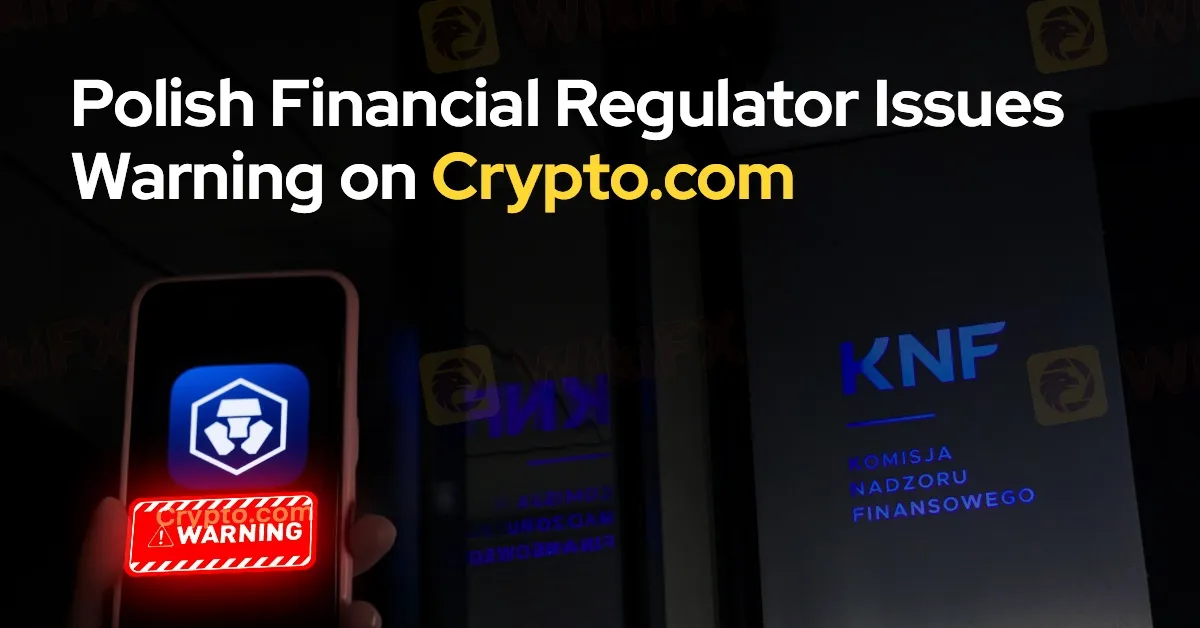简体中文
繁體中文
English
Pусский
日本語
ภาษาไทย
Tiếng Việt
Bahasa Indonesia
Español
हिन्दी
Filippiiniläinen
Français
Deutsch
Português
Türkçe
한국어
العربية
Polish Financial Regulator Issues Warning on Crypto.com
Abstract:The Polish Financial Supervision Authority (KNF) has recently issued a cautionary warning regarding Foris DAX MT, the Malta-based entity operating under the Crypto.com brand

The Polish Financial Supervision Authority (KNF) has recently issued a cautionary warning regarding Foris DAX MT, the Malta-based entity operating under the Crypto.com brand. This alert, though not an outright ban, aims to inform Polish investors of potential risks linked to Crypto.com's operations in Poland, emphasising the need for due diligence when engaging with foreign crypto platforms.
Under Polish law, companies that provide brokerage or investment services within Poland are required to hold proper licenses. According to Article 178 of the Act on Trading in Financial Instruments, these licenses are essential for regulatory compliance. The KNF flagged Foris DAX MT for potentially breaching these licensing requirements and has referred the matter to the Warsaw Regional Prosecutors Office for further examination.

Currently, Crypto.com is not on the KNF‘s blacklist, which would signify outright prohibition. However, the warning serves as an alert for Polish citizens about potential unauthorised financial activities from the company. The KNF’s public warning list, which includes 413 institutions as of now, primarily aims to protect consumers from firms suspected of engaging in unlicensed financial services. Crypto.com, as the largest entity on this list, is under scrutiny, though the final course of action will depend on the Prosecutor‘s Office’s review.
In response to the KNF‘s alert, a spokesperson for Crypto.com clarified that the company is actively working with legal advisors to address the regulator’s concerns and ensure compliance. Tomek Kolodziejczuk, a Bitcoin advocate in Poland, noted that the warning does not signify a ban but is an essential reminder for investors to stay aware of regulatory statuses when engaging with crypto platforms.
The scrutiny from Polands financial regulator aligns with broader efforts to oversee cryptocurrency activities without outright prohibition. Although Poland has not banned virtual assets, the KNF remains cautious and encourages a balanced regulatory approach, similar to other nations. The regulator frequently advises consumers to exercise caution, given the high volatility, complex nature, and lack of robust consumer protections within many cryptocurrency markets.
KNF officials have consistently warned potential crypto investors that trading in digital assets carries substantial risk, including the possibility of total financial loss. The regulator emphasises that while crypto trading is legal within Poland, it lacks the extensive consumer protection measures typically found in traditional financial products. The KNF's stance aims to educate the public on the inherent risks and volatility associated with cryptocurrencies, as well as to mitigate the possibility of misuse or financial crime within the industry.
Meanwhile, on the international front, Crypto.com CEO Kris Marszalek recently announced a lawsuit against the U.S. Securities and Exchange Commission (SEC), accusing the regulatory body of overreach, which he claims has negatively impacted millions of crypto holders in the United States. The move highlights the challenges cryptocurrency firms face in navigating various national regulatory landscapes, as crypto regulations continue to evolve globally.
Ultimately, the KNF‘s actions underscore Poland’s cautious yet permissive stance toward crypto-assets, emphasising regulatory compliance while providing investors with ample information to make informed decisions.

Disclaimer:
The views in this article only represent the author's personal views, and do not constitute investment advice on this platform. This platform does not guarantee the accuracy, completeness and timeliness of the information in the article, and will not be liable for any loss caused by the use of or reliance on the information in the article.
Read more

BaFin Halts USDe Token Issuance, Citing Serious Compliance Failures
The German regulator BaFin has frozen USDe token issuance amid compliance issues. What led to this drastic move, and how does it impact the market?

Singapore Police Crack Down on Scams: $1.9M Seized, 25 Arrested
Singapore Police arrested 25 people, froze 300 bank accounts, and seized $1.9 million in an islandwide operation targeting government, investment, and job scams.

SILEGX Investment Scam Unravels: Millions Lost in Crypto Fraud
Authorities in Malaysia have launched investigations into the SILEGX investment scam, which has resulted in financial losses amounting to RM41.5 million. A total of 46 investigation papers have been opened, with victims spanning a range of professions, including retirees, businessmen, teachers, engineers, and a doctor.

FX vs Crypto Trading: Which Strategy is Best for You in 2025?
As financial markets develop, traders in 2025 will confront an exciting yet frightening decision: FX or cryptocurrency trading. Both provide distinct possibilities to benefit from market fluctuations, but they appeal to various risk tolerances, skill levels, and ambitions.
WikiFX Broker
Latest News
Forex Market Outlook: Key Currency Pairs and Trading Strategies for March 24–28, 2025
Singapore Police Crack Down on Scams: $1.9M Seized, 25 Arrested
Gold Prices Swing Near Record Highs
XTB Opens New Dubai Office
The Growing Threat of Fake Emails and Phishing Scams
Africa Cybercrime Bust: Over 300 Arrested in Fraud Crackdown
Hong Kong Banks and Authorities Collaborate to Freeze Fraudulent Accounts Faster
SocialFi and the Forex Market: A New Era for Decentralized Social Trading?
Is Billion Bucks Fx Scam?
BaFin Halts USDe Token Issuance, Citing Serious Compliance Failures
Currency Calculator







